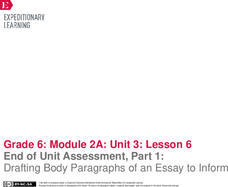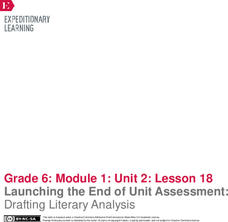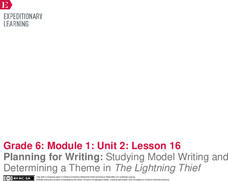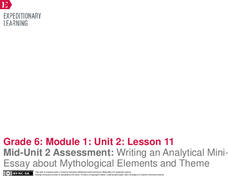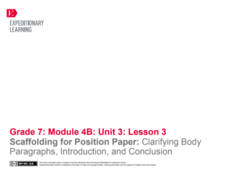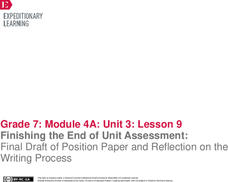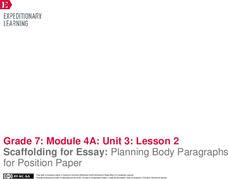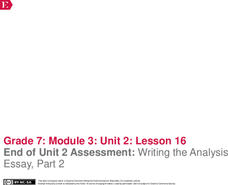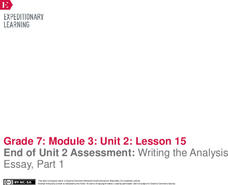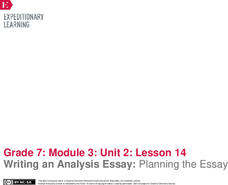EngageNY
End of Unit Assessment, Part 1: Drafting Body Paragraphs of an Essay to Inform
Anybody can write a body paragraph! Pupils analyze the development of ideas in a body paragraph from a model essay. Next, using what they've learned, they draft the body paragraphs of their My Rule to Live By informative essay.
EngageNY
Analyzing the Structure and Content of an Essay to Inform
Outlines are a great asset to essay planning. Scholars read and analyze a model essay about the importance of daily reading and consider how it would look in an outline format. Next, they outline their own informative essays about rules...
EngageNY
Peer Critique and Pronoun Mini-Lesson: Revising Draft Literary Analysis
See what peers really think. Scholars give a peer critique of the their essay drafts from the previous lesson plan. They then participate in a mini lesson plan about pronouns. Pupils write examples of each type of pronoun on sticky notes...
EngageNY
Launching the End of Unit Assessment: Drafting Literary Analysis
Is there a connection? Scholars work to write a summary and theme to connect The Lightning Thief and myth of Cronus. They begin by looking at a model essay and then work on their own drafts.
EngageNY
Planning for Writing: Studying Model Writing and Determining a Theme in The Lightning Thief
A theme runs through it. Scholars analyze how a common theme runs through the myths they have read and The Lightning Thief. They complete graphic organizers and view a four paragraph model essay. They analyze the essay for structure and...
EngageNY
Mid-Unit 2 Assessment: Writing an Analytical MiniEssay about Mythological Elements and Theme
Two is company. Scholars pair up to continue their mini essay writing from the previous instructional activity. They work on their introduction and conclusion paragraphs and then trade partners for peer feedback and a fresh set of eyes...
EngageNY
Final Performance Task: Sharing Visual Representations of Position Papers
Let's take a stroll! Scholars go on a gallery walk to view the visual representations for the performance task created by the class. They then view a variety of books about environment and sustainability and conduct book talks on the...
EngageNY
Finishing the End of Unit 3 Assessment: Final Draft of Position Paper and Reflection on the Writing Process
Scholars work on the end of the unit assessment by reflecting on their writing. They answer questions about the process they used to complete their position paper essays. After completing the end of unit assessment, they add images to...
EngageNY
End of Unit Assessment, Part 1, Continued: Revising Vocabulary and Conventions based on Feedback
Howdy, partner! Scholars partner up to look at the last two rows in the writing rubric. After discussing the details in the rubric about organization and conventions, learners use colored writing tools to circle feedback in their...
EngageNY
Mid-Unit 3 Assessment: Drafting the Position Paper
Organize your thoughts! Scholars work on the drafts of their position papers about sustainable water management. The draft serves as their mid-unit assessment. Before beginning, the class discusses the prompt and then learners work...
EngageNY
Scaffolding for Position Paper: Clarifying Body Paragraphs, Introduction, and Conclusion
Let's have a talk. Scholars talk through the body paragraphs of their Sustainable Water Management position paper with peers. They take turns explaining their work to one another. They then begin to work independently on the introduction...
EngageNY
Scaffolding for Essay: Planning Body Paragraphs for Position Paper This work is licensed under a Creative Commons Attribution-NonCom
Scholars begin creating a plan for their position papers using a Sustainable Water Management Position Paper Planner. They talk with partners about their claims and counterclaims for the essays. Writers then work independently to...
EngageNY
Final Performance Task: Sharing Visual Representations of Position Papers
Take note! Scholars use sticky notes to record information as they gallery walk to look at classmates' visual representations they created for their end of unit assessment. Learners then choose one word that represents the work they...
EngageNY
Finishing the End of Unit Assessment: Final Draft of Position Paper and Reflection on the Writing Process
Think about it. Writers think about their end of unit essays through reflection. They use the End of Unit 3 Assessment, Part 2: Reflection on the Writing Process handout to analyze the writing process they used to create their...
EngageNY
End of Unit Assessment, Part 1: Revising Claims and Evidence Based on Feedback
Revisit, revise. Scholars receive their position papers returned with feedback from the teacher. They use colored pens to identify feedback related to the first two rows of the rubric and correct their papers based on the comments....
EngageNY
Scaffolding for Essay: Planning Body Paragraphs for Position Paper
Let's make a plan. Scholars work on the plan for their papers using a Position Paper Planner. They talk with a partner about counterclaims and think about counterclaims to include in their papers. As learners begin to write, they work...
EngageNY
End of Unit Assessment, Part 1, Continued: Revising Vocabulary and Conventions Based on Feedback
Writers align their position papers with the last two rows in the rubric. After looking at the rubric rows for vocabulary and conventions along with feedback on their papers, class members revise their essays. They then look at the...
EngageNY
Scaffolding for Position Paper: Clarifying Body Paragraphs, Introduction, and Conclusion
All clear! Scholars read through the body paragraphs of their position papers to ensure clarity. They also review their planners to make sure all information is paraphrased without plagiarism. When satisfied with the body paragraphs,...
EngageNY
End of Unit 2 Assessment: Writing the Analysis Essay, Part 2
Writers have 30 minutes to add the final touches to their end-of-unit assessments for Narrative of the Life of Frederick
Douglass. Those finishing early review their work. After the 30 minutes, learners use the time to review their...
EngageNY
End of Unit 2 Assessment: Writing the Analysis Essay, Part 1
1,2,3,4 score! Writers use the grading rubric to score the model essay. After comparing and discussing their scorings, the individuals begin the end-of-unit assessment.
EngageNY
Writing an Analysis Essay: Planning the Essay
Writers work on creating a plan for their end-of-unit essay of Narrative of the Life of Frederick Douglass using a Frederick Douglass Essay Planner to help guide their thought process. They then regroup as a class to...
EngageNY
Writing an Analysis Essay: Introducing the Writing Prompt and the Model Essay
A model analysis essay provides writers with an opportunity to examine a response to the end-of-unit assessment writing prompt. Scholars define key words in the prompt and discuss how the model essay meets the demands in the prompt....
EngageNY
End of Unit 2 Assessment, Part 1: Drafting the Essay
Young writers use the class time to complete a draft argumentative essay. In answer to the Pygmalion end-of-unit prompt they discuss the change seen in Eliza's inner identity.
EngageNY
End of Unit Assessment, Part 2: Revise Essay Drafts
And now for the grand finale! Scholars prepare their final Pygmalion end-of-unit essays. Learners participate in a brief mini lesson about correcting errors and then begin revising their own argumentative essays.


